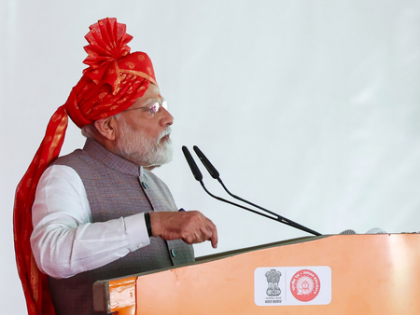PM Modi inaugurates 11 Amrit Bharat Railway stations in MP, Chhattisgarh
By IANS | Updated: May 22, 2025 15:27 IST2025-05-22T15:20:54+5:302025-05-22T15:27:56+5:30
Narmadapuram, May 22 Prime Minister Narendra Modi, in a momentous occasion, virtually inaugurated 103 railway stations from Deshnok ...

PM Modi inaugurates 11 Amrit Bharat Railway stations in MP, Chhattisgarh
Narmadapuram, May 22 Prime Minister Narendra Modi, in a momentous occasion, virtually inaugurated 103 railway stations from Deshnok (Rajasthan) a town near the Pakistan border, marking another chapter in India's infrastructural transformation.
Prime Minister Modi on Thursday offered prayers at the Karni Mata temple before inaugurating the redeveloped Deshnok railway station in Rajasthan's Bikaner district.
PM Modi also flagged-off the Bikaner-Mumbai Express from Deshnok, laid the foundation stone and dedicated to the nation multiple development projects worth more than Rs 26,000 crore.
Rani Kamlapati Railway station, Bhopal was the first world-class railway station under the project.
Among these redeveloped railway stations, five are in Chhattisgarh, where Chief Minister Vishnu Deo Sai participated in the event.
Similar ceremonies were organised across the nation, with key officials and dignitaries present at their respective locations, including Chhattisgarh Governor Ramen Deka in Urkura, Raipur, Union Minister of State Tokhan Sahu in Bhilai, Deputy Chief Minister Arun Sao in Bhanupratappur, and Santosh Pandey, member of Parliament from Rajnandgaon seat in Dongargarh.
In Madhya Pradesh, six railway stations - Narmadapuram, Shridham, Katni South, Shajapur, Seoni, and Orchha - were inaugurated under the Amrit Bharat Station Yojana.
Chief Minister Mohan Yadav, present at Narmadapuram (erstwhile Hoshangabad), reflected on the shifting landscape of India's progress, emphasising that Vande Bharat and Metro train coaches would soon be manufactured at BHEL, Bhopal.
Narmadapuram is 72 Km away from the state capital, Bhopal.
CM Yadav evoked Swami Vivekananda's prophecy from 1904, stating that the 21st century would belong to India - a vision that is now materialising.
The Narmadapuram railway station, redeveloped with an investment exceeding Rs 26 crore, stands as a tribute to the cultural heritage of the mighty river Narmada.
Designed with a thematic essence that mirrors local traditions, the station now boasts numerous amenities for passengers, including modern ticket counters, spacious waiting rooms, and enhanced accessibility features such as special ramps and restrooms for the disabled.
A newly constructed 12-metre-wide foot-over bridge, the broadest in the Bhopal division, further accentuates the structural advancements.
The grandeur of this modernisation project extends far beyond individual stations, with over 1300 railway stations undergoing redevelopment under the Amrit Bharat Station Scheme.
Addressing the nation, Prime Minister Modi articulated his vision of India's rapid infrastructure growth, stating that dedicated freight corridors are being built, ensuring seamless cargo transportation, while the ambitious bullet train project is well underway. His words carried a tone of national pride, affirming that India’s infrastructural achievements are captivating global attention.
He cited engineering marvels such as the Chenab Bridge in the north, the Bogibeel Bridge in Assam, Atal Setu in Mumbai, and the Pamban Bridge in the south - each a testament to the nation’s ambitious construction prowess. PM Modi reinforced that India is not just upgrading its railway stations but is also modernising its trains.
The Vande Bharat and Namo Bharat trains, symbolic of the country's newfound speed and efficiency, are operational across 70 routes.
Over the past 11 years, hundreds of road overbridges and underbridges have been constructed, with more than 34,000 kilometres of fresh rail tracks laid - an infrastructural leap that reaffirms the government’s commitment to progress.
The Amrit Bharat Station Scheme has further ensured the inclusion of dedicated waiting areas for women and ramps for disabled passengers, enhancing accessibility across the railway network. The transformation of railway stations is not just about infrastructure but also about preserving local heritage.
PM Modi remarked that at Orchha station in Madhya Pradesh, the aura of Lord Rama will be palpable, reflecting the harmonious blend of tradition and progress.
As the modernisation drive propels forward, the Prime Minister's assertion remains clear - India is setting new benchmarks in transport infrastructure, balancing development with its rich cultural identity. Introduced in 2022, the Amrit Bharat Station Scheme is a transformative initiative aimed at modernising railway stations and evolving them into bustling city centres.
As per the Ministry of Railways, the scheme follows a meticulous approach, tailoring development plans to suit the unique requirements of each station, with upgrades implemented in carefully structured phases.
Under this initiative, select railway stations will be equipped with executive lounges and designated spaces for business meetings, offering enhanced convenience to travellers.
Additionally, local artisans and entrepreneurs will find new opportunities through the 'One Station One Product' scheme, which will feature kiosks dedicated to selling region-specific goods.
Several railway stations have already undergone redevelopment as part of the scheme's initial phase. These include Rani Kamlapati in Madhya Pradesh, Gandhinagar Capital in Gujarat, Sir M V Terminal in Karnataka, Ayodhya Dham in Uttar Pradesh, the first phase of Gomti Nagar railway station, and the newly developed second entrance of Cuttack station in Odisha. These projects served as pioneering examples, shaping the broader implementation of the scheme.
Data from the Railway Ministry reflects the substantial investment directed toward improving passenger amenities.
In the fiscal year 2023-24, approximately Rs 8,000 crore was spent on customer-centric enhancements. The financial plan for 2024-25 had set an expenditure target of Rs 12,992 crore, while an impressive Rs 12,000 crore has been allocated for the current fiscal year 2025-26, ensuring continued progress in railway infrastructure.
Disclaimer: This post has been auto-published from an agency feed without any modifications to the text and has not been reviewed by an editor
Open in app